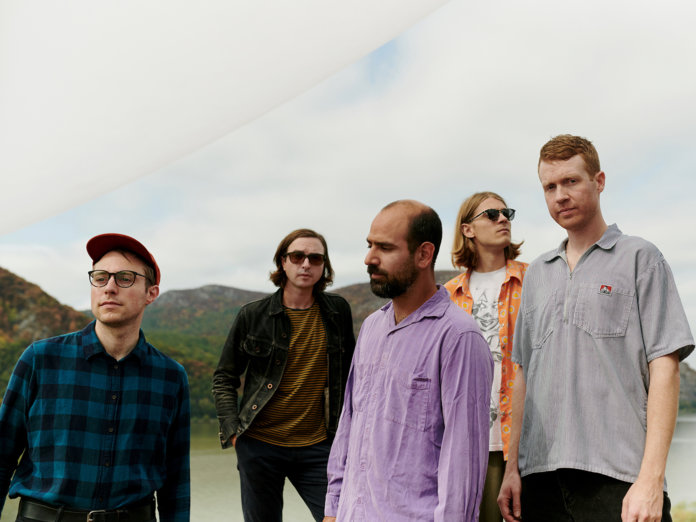Since they formed in 2008, Real Estate have stood for an ideal of sweet, bucolic guitar pop, equally informed by British jangle-pop from the ’80s (think Felt, East Village, early Primal Scream), the lo-fi explorations of NZ’s Flying Nun brigade, and a more ornate, folksy classicism, following a throughline from Nick Drake to The Clientele. There’s an autumnal gait to their music: centred and wistful, it’s a specific vision of what the pop song can do. With every album a variation on that theme, for Real Estate the devil is very much in the details; what will they have done to draw something new and poignant out of their music this time?
In 2020, Real Estate are breathing out. The Main Thing feels luxuriant, particularly after the tightly locked In Mind three years ago. This was a conscious decision for Real Estate co-founder Martin Courtney: “I wanted to make a more chaotic, messy-sounding album, something that I think reflected the subject matter in the songs, and the world we are living in currently.” ‘Messy’ might be pushing it a little – even at their most open-ended, these songs still feel tightly scripted. But there’s certainly, at times, a creative tension between the lushness of the album’s production, and the doubt and uncertainty that Courtney explores in many of his lyrics.
Tellingly, it’s the first album where the core group have brought in outsiders to flesh out their arrangements – a string quartet appears on a number of songs, elsewhere there are extra vocals, percussion and keyboards. This intricacy has resulted in an album that shares the poise of groups like Prefab Sprout and The Pale Fountains, who made music during a window of opportunity, across the mid-1980s, where the pop landscape opened up to rigorous self-awareness. You can also hear touches of hypnagogic pop here, in the blanket of haze that descends on some of the songs; it’s particularly notable in Julian Lynch’s first song for the group, “Also A But”, which isn’t surprising given that his solo albums trade in precisely that kind of ‘articulate vagueness’.
In a sense, “Also A But”, with its abstract sense of foreboding, and its spiralling, subtly psychedelic tone, acts as a centrifugal force for the album. Core to The Main Thing is a reflection on uncertainty and the passing of time, particularly across a number of Courtney’s songs, where his role as family man leads him to question his understanding of his career and its broader place in the world. It’s something Courtney acknowledges when considering what motivates his writing, observing that some of these songs are reflective of his “starting to feel like I’m not getting any younger, and am I going to look back when I’m old and be proud of what I’ve accomplished in life”.
So “Friday” opens the album, a dreamy fug of synths drifting across the song’s gentle architecture, with Courtney “[trying] to hold on to the whole illusion of control”, while pondering hard-won futures, “standing on that gilded ridge/Wondering where the next step is.” “You” is classic Real Estate guitar pop, chiming six-strings glinting like moulded glass, while Courtney hymns a gentle melody to his children and their “earliest memories”, urging them to “for now, enjoy the innocence”. “The Main Thing” itself is one of the few moments where the album threatens to break out a sweat, glistening with incident as Courtney weaves a gorgeous melody across Jordan Pollis’s sweetly detailed rhythms.
It’s a lovely album, then, one that’s full of surface pleasure, and these are well-written, sturdy songs, rich with strong melody and atmosphere. But The Main Thing’s lushness can also risk homogeneity (and at moments, it feels like that’s just about the only risk here); sometimes, despite Courtney’s desire to make a ‘messy-sounding album’, the song’s edges have been blunted, their surfaces buffed to an almost inhuman sheen. It might be churlish to begrudge the album its largely pacific musical temperament, but the tension between the lyrics, full of doubt and germane reflection, and the sometimes aura-less songs, isn’t always productive.
Still, that’s a minor criticism relative to the successes here. There’s another clutch of great Real Estate songs on this gentle delight, and some clues as to where the group could go next, if they chose to really stretch out and see what else their songs could do.



